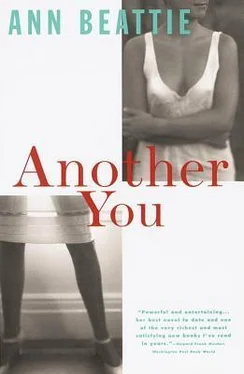Ann Beattie - Another You
Здесь есть возможность читать онлайн «Ann Beattie - Another You» весь текст электронной книги совершенно бесплатно (целиком полную версию без сокращений). В некоторых случаях можно слушать аудио, скачать через торрент в формате fb2 и присутствует краткое содержание. Год выпуска: 2014, Издательство: Vintage Books, Жанр: Современная проза, на английском языке. Описание произведения, (предисловие) а так же отзывы посетителей доступны на портале библиотеки ЛибКат.
- Название:Another You
- Автор:
- Издательство:Vintage Books
- Жанр:
- Год:2014
- ISBN:нет данных
- Рейтинг книги:5 / 5. Голосов: 1
-
Избранное:Добавить в избранное
- Отзывы:
-
Ваша оценка:
- 100
- 1
- 2
- 3
- 4
- 5
Another You: краткое содержание, описание и аннотация
Предлагаем к чтению аннотацию, описание, краткое содержание или предисловие (зависит от того, что написал сам автор книги «Another You»). Если вы не нашли необходимую информацию о книге — напишите в комментариях, мы постараемся отыскать её.
Another You — читать онлайн бесплатно полную книгу (весь текст) целиком
Ниже представлен текст книги, разбитый по страницам. Система сохранения места последней прочитанной страницы, позволяет с удобством читать онлайн бесплатно книгу «Another You», без необходимости каждый раз заново искать на чём Вы остановились. Поставьте закладку, и сможете в любой момент перейти на страницу, на которой закончили чтение.
Интервал:
Закладка:
Cheryl was on the second-floor landing, sitting in a lawn chair, as if she were sunning herself at the beach. Instead of a bathing suit, though, she wore a sweaterdress. “Thanks for coming, Marshall,” she said, “but I’m here to head you off. This is pretty unbelievable, but she’s got a boyfriend from Chicago who just came into town. I don’t know why she couldn’t have told us she was engaged, but half an hour ago we found out he existed, then that he was coming, and believe it or not, he’s in there now and they’ve called out for pizza.”
What a confusing, pointless night. And how stupid that he was standing halfway up the stairs in Cheryl Lanier’s apartment, holding cookies and Cokes. Though what the hell? What the hell, really. Banished from her apartment to the chilly hallway, the other roommate … where was the other roommate?… the situation being what it was, maybe he should just sit on the landing, open a Coke, take a breather before turning around and going home. As if she’d read his mind about the missing roommate, she said, “Timothy thought he’d better go back to the library. I thought I’d sit here and wait for you and apologize. She’s in there all cheered up, and suddenly it’s like I’m the problem, like I was overreacting all the time she was crying and waking me up at night screaming with nightmares. I mean, Timothy was sort of upset, because she’d been crying on his shoulder all day, and now he thinks she’s been using us. That she overreacted. But I mean, McCallum did those things. He’s a sick man.” She looked inside, then looked back at him. “I don’t know what’s going on anymore.”
“Coke?” he said.
“Oreo.” She smiled.
The absurdity of getting involved in young people’s problems. All this drama over what was probably nothing, while a responsible husband would have been at his wife’s side as she sat in the hospital with his dying stepmother, but instead he was having a little late-night party on the dimly lit landing of an apartment house, sitting on the dusty floor atop a flight of stairs like a servant at the beck and call of the Queen, who happened to be sitting not on a throne, but in a lawn chair. He barely knew Cheryl Lanier. She was the one who had the crush on him. She was the one who had mentioned a “date,” taken his hand in the car, tried to involve him in something. As he sat on the landing, the rushing around of the past hour making him feel suddenly more defeated than truly tired, the door creaked open behind Cheryl.
“That the pizza?” a man’s voice said.
“No. I’m here with a friend of mine,” Cheryl said. She sounded more defeated than Marshall. She said it with the matter-of-factness of someone saying, I give up .
“You can come in, you know. I don’t know why you won’t stay in the apartment with us.” It was a girl’s voice; Livan’s voice.
“Aren’t the pizzas free if they don’t get here in half an hour?” the man said. Still, there was only the cracked door, a pale zipper of light. It was clear that Cheryl didn’t mean to answer the question. Nor did she have to, because a few seconds later, while the door was still ajar, a car pulled up and a delivery boy got out, racing into the apartment with the pizza in an insulated silver bag, taking the steps two at a time.
“Twenty-seven minutes,” the man said, opening the door. He was a man, not a boy: thirty or so, Marshall guessed — short, bad skin, wearing aviator glasses and a fisherman’s sweater that sagged low over his jeans. Clearly none of it looked strange to the deliveryman, who decided to hand the box to Cheryl, though it was the man who reached into his pocket and took out folded dollar bills, counting the money twice and telling him to keep the change. Who could imagine what the deliveryman saw every night? To him, they were just a bunch of perfectly normal people standing around waiting for food. What would it even matter that one was a professor, another a student, and that the pock-marked man had just arrived from Chicago? Marshall watched him disappear, taking the steps three at a time, staring after him until he heard the front door bang shut.
Beside the man now holding the pizza box — the man who looked through Marshall with complete indifference, as if he didn’t exist; no greeting, nothing — beside the man rolling his eyes comically, as if enjoying a little joke with himself as he held the box to his nose and inhaled the pizza’s aroma, stood a girl, a tall girl, about five-foot-ten, her eyes swollen from crying, her hair dishevelled, a clump gathered back in a ponytail, the rest tangling free. She was wearing sweatpants, an orange pullover sweater, and fuzzy slippers made to look like rabbits. Unlike her friend, who had turned and gone back into the apartment, she looked at him, then at Cheryl, with what he could only think was disdain, as if they were squatters camping in the hall. She stood before them, a girl looking with empty eyes at her roommate and then — too much appraisal creeping in for her look to be described as dispassionate — looking once again at the stranger who sat at Cheryl’s feet. He could see himself through her eyes: a teacher, a man who now, by definition, was to be distrusted; perhaps he was also a fool for rushing over, or at the very least ineffectual. It was the last thing he would have expected: that he would dislike Livan, feel no sympathy for her. For a while, he had intended to be judicious — hadn’t that been his plan, such as it was? — to feel her out, see if she was convincing as she talked about McCallum, and then, assuming she was convincing, to begin to persuade her that she must get help. Apparently, help had been a phone call away, all along. And he and Cheryl, neither of them in that moment feeling anything but exploited, were behaving, by their silence and with their dropped eyes, as if she had a right to judge them. His sympathy was for Cheryl — Cheryl, out on the landing — and for himself: no dinner; a tiring ruined evening, his valuable time wasted because he’d convinced himself he must go on a mercy mission.
“Get your coat and we’ll get out of here,” he said to Cheryl.
“Thanks,” she said, “but you’ve done enough.”
“Let’s go,” he said, standing. He had tried that line with Sonja so many times during Evie’s hospitalization, but all she’d agree to do was to step out of Evie’s room while they worked on her. He couldn’t do anything for Evie, but maybe he could do something for Cheryl Lanier. “Don’t blame yourself,” he said. “Come on. Let’s go.”
“She’s got a student loan they’re not renewing unless she gets her grades up. Maybe that’s all she’s really upset about,” Cheryl said.
“I spoke to McCallum on the phone tonight,” he said. “Apparently he’s got something to feel guilty about.” He remembered the sound of something crashing in the background, heard McCallum’s voice asking, “Do I want to be dead?”
“I’ve got a friend I can stay with in Dover,” she said. “Would you mind giving me a ride?”
“Sure,” he said. “I’ll drop you in Dover.”
She folded the chair and leaned it against the wall. Now, from inside the apartment, he could smell the marijuana Cheryl had talked about, hear muffled laughter above the rock and roll.
“I spent a lot of time sitting in stairwells when I was growing up, when my father started in on my mother. He never hit her, but he’d scream like one of those people they pay to start things shaking at rock concerts. You know, one of the foxes.” She tried again: “A plant.”
“You mean that isn’t just unbridled enthusiasm?”
“Sometimes, sure. But they pay people, too. They did when the Beatles first came to the United States. Did you know that?”
Читать дальшеИнтервал:
Закладка:
Похожие книги на «Another You»
Представляем Вашему вниманию похожие книги на «Another You» списком для выбора. Мы отобрали схожую по названию и смыслу литературу в надежде предоставить читателям больше вариантов отыскать новые, интересные, ещё непрочитанные произведения.
Обсуждение, отзывы о книге «Another You» и просто собственные мнения читателей. Оставьте ваши комментарии, напишите, что Вы думаете о произведении, его смысле или главных героях. Укажите что конкретно понравилось, а что нет, и почему Вы так считаете.












